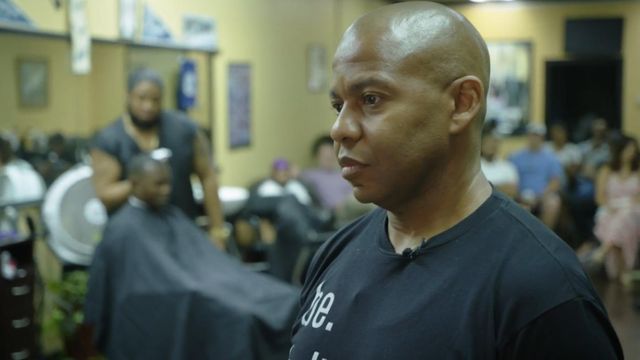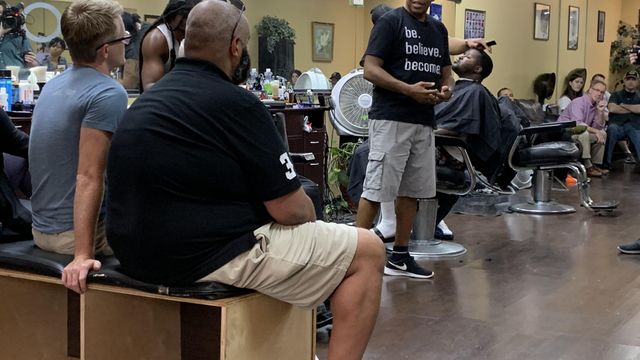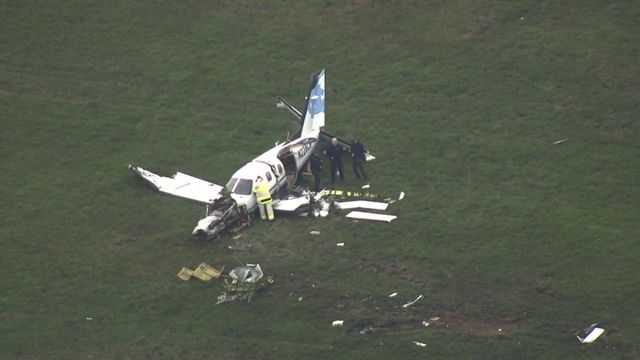Cary barbershop 'rap session' tackles racism, offensive language in monthly gathering
A group of people gathered at Headliners Barber Shop in Cary last Saturday with the goal of opening lines of communication to create a better community.
The "rap session," which occurs once a month, was designed five years ago after the shooting of Michael Brown in Ferguson, Mo., "to build a bridge between the black community and the law enforcement in Cary," Tru Pettigrew, the founder of Tru Access, said. Since then, it has grown into a dialogue to create relationships with community members from all walks of life.
The goal of Tru Access is to help individuals and organizations bridge gaps across areas that cause division, dysfunction and separation, according to the organization's website.
From a Cary councilman and Cary and Morrisville law enforcement officers to a new resident, living in Cary for only two months, everyone's opinions and ideas are welcome at Pettigrew's meetings.
The goal of these meetings is to collaborate on ideas to build a stronger and more inclusive community for all, Pettigrew said.
In light of the recent incident where a woman used a racial slur at the Bonefish Grill in North Hills and as the 2020 presidential election draws near, Pettigrew utilized the August gathering to address how different people can react to certain words and phrases that may be offensive.
On July 23, Nancy Goodman called a group of black women rude, complained that they were being too loud and used a racial slur towards them. She said she knew the word she used was offensive and would use the racial slur again.
Pettigrew said this offensive language stems from a spirit of supremacy that plagues the nation.
"We are in a very volatile climate in our society, and it could get worse as we approach the 2020 election," he said.
He asked those assembled, "How are you going to respond when you hear something that offends you?"
As he opened the floor for discussion, the crowd came to the conclusion that actions like Goodman’s originate from how parents and guardians raise their children, including the music children listen to and the video games they play.
"It all starts in the home," one individual said. "If you never teach them the power of words, they'll feel like they can do whatever when they leave the house."
Tyler Croneberger, the school resource officer at Panther Creek High School, said the best way to approach a situation where offensive language is used is to prevent it from happening again. He mentioned an incident where he experienced a white individual using a racial slur towards black students and how he de-escalated the situation by warning the student of the consequences he may face.
"He seemed surprised at how inappropriate it was," Croneberger said. "He was just using it so freely, I guess, and no one had ever checked him on it. Nobody had ever checked that lady, possibly. Nobody had ever told her or walked her through it at a younger age, which kind of explains how she used it so freely and openly."
Anthony Smith, a barber at Headliners, said he and his son go over offensive words so he knows how to react if he were to hear them at school, reminding him that "you don't play with those kids."
Randy Byrd, a police sergeant for the Town of Cary, said there's a comparison to be made between ignorance of the law, which is no excuse in his field, and racism.
"There's no standard, you should know better," Pettigrew said. "Sometimes the ignorance is real because they've never been checked."
In order to prevent the situation from happening again, many in the barbershop suggested learning the history and context of certain offensive words because those are lessons missing from the curriculum at some local schools.

"If you don’t have friends who aren’t like you and don’t look like you, there’s no way to know," one man, who works with some Caucasian people who use racial slurs at work, said. "They don’t teach African-American history in school. It’s not a core class, it’s an elective."
"I don't think he was taught about how it means and how it hurts," one woman said of the individual Croneberger confronted.
Pettigrew also tackled micro-aggressions during the session, words that don't seem to be offensive on the outside but have negative connotations. For example, saying someone "went down the river" may not seem offensive, but it translates to someone going further south along the Mississippi River to harsher slave owners, Pettigrew said.
"A better world starts with a better you," he said. "The responsibility lies within each of us individually."
As the gathering drew to a close, the group created a list of action steps that would allow the community to go beyond diversity and create inclusion.
Members of the discussion challenged each other to make friends with people who don't look, live or think like you; educate themselves about other cultures; put themselves in uncomfortable situations that allow for growth; ask why we aren't inclusive already; and elect leaders that have responsibility over the people they have stewardship over.
"Community is what you make of it," District B representative of the Town of Cary Don Frantz said. "The more you give back, the better it is."
For more information on how to get involved in these "rap sessions," visit their Facebook page and this advertisement.












